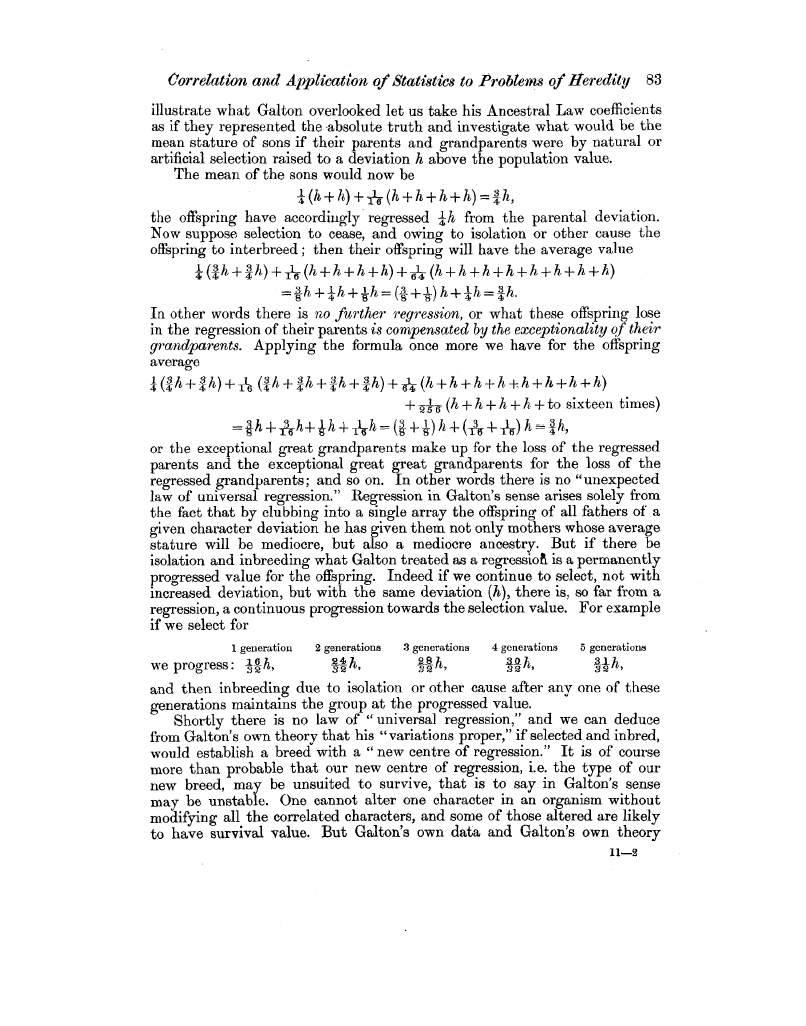| ||||||

OCR Rendition - approximate
Correlation and Application of Statistics to Problems of Heredity 83 illustrate what Galton overlooked let us take his Ancestral Law coefficients as if they represented the -absolute truth and investigate what would be the mean stature of sons if their parents and grandparents were by natural or artificial selection raised to a deviation h above the population value. The mean of the sons would now be 4 (h+h)+'(h+h+h+h)=4h, the offspring have accordingly' regressed 4 h from the parental deviation. Now suppose selection to cease, and owing to isolation or other cause the offspring to interbreed ; then their offspring will have the average value 4 (4h +4 h)+ e (h+h+h+ h)+ 4 (h+h+h+h+h+h+h+h) =8h+4h+Sh=(--s+1)h+4h=ah. In other words there is no further regression, or what these offspring lose in the regression of their parents is compensated by the exceptionality of their grandparents. Applying the formula once more we have for the offspring average 1(4h+4h)+16 (4h+34 4 h+3s-,h+3h)+s4 (h+h+h+h +h+h+h+h) + 2 5 s (h + h + h + h + to sixteen times) =Sh+6h+8h+~h=(a+s)h+(e+ )h=43h, or the exceptional great grandparents make up for the loss of the regressed parents and the exceptional great great grandparents for the loss of the regressed grandparents; and so on. In other words there is no "unexpected law of universal regression." Regression in Galton's sense arises solely from the fact that by clubbing into a single array the offspring of all fathers of a given character deviation he has given them not only mothers whose average stature will be mediocre, but also a mediocre ancestry. But if there be isolation and inbreeding what Galton treated as a regressio I is a permanently progressed value for the offspring. Indeed if we continue to select, not with increased deviation, but with the same deviation (h), there is, so far from a regression, a continuous progression towards the selection value. For example if we select for 1 generation 2 generations 3 generations 4 generations 5 generations we progress: 32h, 32 h, 32h, 32h, 32h, and then inbreeding due to isolation or other cause after any one of these generations maintains the group at the progressed value. Shortly there is no law of "universal regression, and we can deduce from Gallon's own theory that his "variations proper," if selected and inbred, would establish a breed with a " new centre of regression." It is of course more than probable that our new centre of regression, i.e. the type of our new breed, may be unsuited to survive, that is to say in Galton's sense may be unstable. One cannot alter one character in an organism without modifying all the correlated characters, and some of those altered are likely to have survival value. But Galton's own data and Galton's own theory 11-2
|